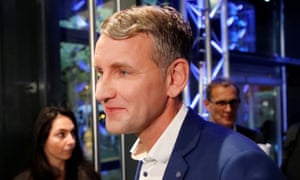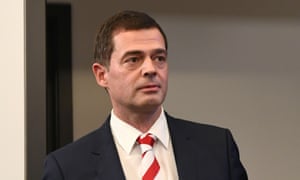The Guardian - Back to home
Far-right AfD surges to second place in German state election
Leftwing Die Linke leads in state of Thuringia, but political landscape is fragmented
 Bjoern Hoecke, Alternative für Deutschland (AfD) party leader and top candidate for the Thuringia state elections. Photograph: Axel Schmidt/Reuters
Bjoern Hoecke, Alternative für Deutschland (AfD) party leader and top candidate for the Thuringia state elections. Photograph: Axel Schmidt/ReutersSun 27 Oct 2019
Anti-immigrant populists beat Angela Merkel’s Christian Democrats (CDU) to second place in an election in the east German state of Thuringia yesterday, building spectacularly on their steady momentum since first entering the Bundestag two years ago.
According to exit polls, the Alternative für Deutschland (AfD) took nearly 24% of the vote, beating the centre-right CDU by one percentage point but, as expected, failing to oust incumbent leftwingers Die Linke. The AfD more than doubled its share of the vote. Despite that, it has no chance of entering power yet, as other parties have ruled out joining it in a coalition.
But the party’s national standing is boosted by the result, which was closely watched in Berlin, as is the status of its state leader Björn Höcke, considered Germany’s most controversial politician, who has been accused of stoking hatred with anti-Jewish rhetoric.
The state now faces months of protracted coalition negotiations. AfD’s showing means it will be impossible for Die Linke (30% of the vote), the left-of-centre Social Democrats (8%) and the Green party (5.5%) to repeat their coalition.
A minority government led by Die Linke is the most likely outcome, reflecting the increasing fragmentation of the political landscape across Germany in recent years.
The CDU, which rules at the national level in a coalition with its Bavarian sister party the CSU and the SPD, suffered its worst result in the state, losing more than 11 percentage points to take 22.5% of the vote.
The election campaign was characterised by Nazi slogans and death threats and overshadowed by the deadly attack on a synagogue in the city of Halle earlier this month.
Mike Möhring, the leader of the CDU in Thuringia, received a death threat during the campaign that quoted the Nazi greeting ‘Heil Hitler!’. Neo-Nazis threatened to stab him in the neck or attack one of his election rallies with a bomb if he did not end his campaign.
The CDU’s general secretary, Paul Ziemiak, said: “It is a bitter result for the CDU ... and this is a bitter day for the democratic centre of Germany in Thuringia.”
Bodo Ramelow, Thuringia’s current prime minister who is extremely popular in the state, has directly blamed Höcke for allowing people to identify with extremist parties.
Ramelow told broadcaster NTV he was proud of Thuringians, who had turned out in record numbers for the vote. He said he hoped that the result would encourage parties who had previously vowed never to work together with his Die Linke to recognise the necessity to do so.
“On a parliamentary level there are various themes on which we can all work together for the common good,” he said. But he was troubled by the AfD’s strong result. “It is painful that voters feel that they need to protest against the grand coalition in this way by choosing someone like Höcke ... But we need to deal with this at the same time, and respect the voters’ decision.”
Speaking to jubilant party faithful on Sunday, Höcke hailed the result as “spectacular”. “I am almost speechless. We fought together, we were victorious together, and now it’s the time to celebrate together.”
The former history teacher, who was accused of contributing to the antisemitic sentiment behind the Halle attack, has drawn criticism for calling Berlin’s Holocaust Memorial a “monument of shame” and for demanding more attention be paid in schools’ history teaching towards ordinary Germans’ suffering in the second world war.
Höcke’s far-right stance is viewed critically within the party, with many AfD members accusing him of threatening its unity. But his ability to draw such an increase in support despite the criticism – even in a state that bears the scars of Germany’s Nazi past with Buchenwald concentration camp – is likely to only bolster support for his tactics.
The Greens’ co-leader Annalena Baerbock said she was disappointed at her party’s performance and that she was “devastated” by the huge gains made by the AfD, referring to it as “fascistic”. She said the result reinforced the need to invest more time and energy in civil society in eastern Germany.
The AfD was formed in 2014 as an anti-establishment force opposed to the euro. It quickly evolved to become an anti-immigrant party following the refugee crisis of 2015 when almost one million refugees arrived in Germany. More recently it has concentrated on highlighting the unjust treatment of eastern German citizens in the 30 years since the fall of the Berlin Wall.
Die Linke, described as radical left, was established in 2007, emerging from the successor party of the former communist governors of eastern Germany.


Geen opmerkingen:
Een reactie posten
Opmerking: Alleen leden van deze blog kunnen een reactie posten.